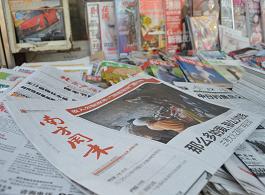
Download Censorship at the ‘Southern Weekly’, one of the most respected newspapers in China, prompted protests in the Southern city of Guangzhou this week.
Newspaper staff first disclosed the details of the propaganda's interference, then demanded the resignation of the propaganda chief in Guangdong province, where the Weekly is based.
This provoked a strong reaction online and hundreds of people gathered outside the media office to show their support.
After a long standoff, reports say that the staff reached a deal with propaganda departments, and the newspaper is now back on China's new stands.
From Beijing, Rebecca Valli has more.
In a YouTube video, a man stands in front of a crowd outside the ‘Southern Weekly’ office in Guangzhou.
“If we can’t guarantee that the ‘Southern Weekly’ is free from censorship”, he says, “how can we hope to find the road to reform in China?”
Other people bring flowers and carry slogans calling for freedom of the press.
‘Southern Weekly’ has a reputation for testing the limits of press freedom in China.
So people took notice when its editors said that their annual new year’s address calling for constitutional reform, had been radically changed.
The local propaganda department ordered the newspaper to publish an editorial filled with pro Communist Party rhetoric instead.
David Bandurski from the ‘China Media Project’, which monitors Chinese press and state censorship, says the censors have gone too far.
“It is not like propaganda leaders go over drafts before they go to press, that kind of censorship is first of all too draconian, it's almost unsupportable. What happens generally is that they send out propaganda directives and those put pressure on the media, they may say “don't report this,” “do report this”. They may direct coverage but that leaves a lot of gaps.”
And through these gaps, Bandurski says, ‘Southern Weekly’ has been able to push the boundaries with their investigative reports.
“So the problem in this case was that they were actually very intrusive before they went to press and after the editor has signed off on it. So they basically wrote the editors out of the process, and they inserted their own content, they being the propaganda leaders of Guangdong and that's where the problem really came in.”
In 2003, ‘Southern Weekly’ wrote an article investigating the death of a young worker who died after being beaten in police custody. The story led to the discovery of a vast network of underground police detention camps.
It also resulted in the detention of the editor who published the story.
Because of its journalistic feats, the newspaper has been under increasing pressure in recent years.
Last year alone, there were over 1,000 articles censored in the ‘Southern Weekly’.
Li Datong is a former editor and a pro-democracy intellectual.
The magazine he ran, called ‘Freezing Point’ was shut down in 2006 for raising sensitive issues.
“This unreasonable and arbitrary choking of news outlets has provoked the anger of everyone that works in the media. This affair is not just one small incident that ends here - it shows the great anger that everyone in the news industry feels against the media management system."
But the row provides a chance for Chinese people to talk about media censorship.
Coverage of the protests is still heavily censored in the mainstream media, but many commentators have managed to post their thoughts online.
One of them is Zhang Xin, CEO of China’s largest real estate development company.
Earlier this week she wrote on her microblog, ‘History is decided by the least unanticipated events’.
The dispute comes in the middle of China’s leadership transition.
Xi Jinping will be named President in March, and he has recently called for broader reforms.
Li Datong questions whether this will be followed by action from the government.
“I hope that this event gives the new leadership an opportunity to realise that the sort of management and control it has over the news is completely unnecessarily. But now they are not in a hurry to reform because the government has not yet changed its leadership, that will happen in March. We do not know if they will be reforming the system, we will just have to wait and see. It’s too early to tell.”













